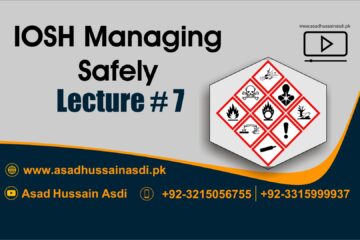ProQual Level 2 Award in Using Computerised Accounting Software in Business Course in Islamabad || Registration Open
Registration Open= +92-3315999937, +92- 3215056755 (WhatsApp Only)
Introduction
This qualification is appropriate for anyone using computerised accounting software in a
business context, in a self-employed or employed capacity in:
- Construction Businesses
- Business Administration
- Health / Beauty / Fitness Businesses
- Retail Businesses
Candidates choose one of the contextualised units relevant to their area of work.
The awarding organisation for this qualification is ProQual Awarding Body and the
regulatory body is the Office of Qualifications and Examinations Regulation (Ofqual). The
specification for these qualifications has been approved by the Welsh Government for use
by centres in Wales.
Entry Requirements
There are no formal entry requirements for this qualification, however, if candidates have
no prior knowledge or experience of using computerised accounting software they would
benefit from the achievement of ProQual Level 2 Award in Accounting Knowledge. Centres
should carry out an initial assessment of candidate skills and knowledge to identify any gaps
and help plan the assessment.
Qualification Profile
Qualification title ProQual Level 2 Award in Using Computerised Accounting
Software in Business
Ofqual qualification number 603/1268/3
Level 2
Total Qualification Time 32 hours (25 GLH)
Assessment
Pass or fail
Internally assessed and verified by centre staff
External quality assurance by ProQual verifiers
Qualification start date 27/3/2017
Qualification end date
ProQual, March 2017
Level 2 Award in Using Computerised Accounting Software in Business
4
Qualification Structure
Candidates must complete ONE of the following units:
K/615/5946 Computerised Accounting for Construction Businesses
M/615/5947 Computerised Accounting for Business Administration
T/615/5948 Computerised Accounting for Health/Beauty/Fitness Businesses
A/615/5949 Computerised Accounting for Retail Businesses
ProQual, March 2017
Level 2 Award in Using Computerised Accounting Software in Business
5
Centre Requirements
Centres must be approved to offer this qualification. If your centre is not approved please
complete and submit form ProQual Additional Qualification Approval Application.
Staff
Staff delivering this qualification must be appropriately qualified and occupationally
competent.
Assessors/Internal Quality Assurance
For each competence-based unit centres must be able to provide at least one assessor and
one internal quality assurance verifier who are suitably qualified for the specific
occupational area. Assessors and internal quality assurance verifiers for competence-based
units or qualifications will normally need to hold appropriate assessor or verifier
qualifications, such as:
- ProQual Level 3 Certificate in Teaching, Training and Assessing
- Award in Assessing Competence in the Work Environment
- Award in Assessing Vocationally Related Achievement
- Certificate in Assessing Vocational Achievement
- Award in the Internal Quality Assurance of Assessment Processes and Practices
- Certificate in Leading the Internal Quality Assurance of Assessment Processes and
Practices
Support for Candidates
Materials produced by centres to support candidates should:
- enable them to track their achievements as they progress through the learning
outcomes and assessment criteria;
- provide information on where ProQual’s policies and procedures can be viewed;
- provide a means of enabling Internal and External Quality Assurance staff to
authenticate evidence
ProQual, March 2017
Level 2 Award in Using Computerised Accounting Software in Business
6
Assessment
Candidates must demonstrate the level of knowledge and competence described in the unit.
Assessment is the process of measuring a candidate’s knowledge and understanding against
the standards set in the qualification.
Assessment guidance is included to assure consistency.
Each candidate is required to produce evidence which demonstrates their achievement of
all of the learning outcomes and assessment criteria for each unit.
Evidence can include: – assignments/projects/reports
– worksheets
– portfolio of evidence
– record of oral and/or written questioning
– candidate test papers
Learning outcomes set out what a candidate is expected to know, understand or be able to
do.
Assessment criteria specify the standard a candidate must meet to show the learning
outcome has been achieved.
Learning outcomes and assessment criteria for this qualification can be found from page 8
onwards.
Internal Quality Assurance
An internal quality assurance verifier confirms that assessment decisions made in centres
are made by competent and qualified assessors, that they are the result of sound and fair
assessment practice and that they are recorded accurately and appropriately.
Adjustments to Assessment
Adjustments to standard assessment arrangements are made on the individual needs of
candidates. ProQual’s Reasonable Adjustments Policy and Special Consideration Policy sets
out the steps to follow when implementing reasonable adjustments and special
considerations and the service that ProQual provides for some of these arrangements.
Centres should contact ProQual for further information or queries about the contents of the
policy.
ProQual, March 2017
Level 2 Award in Using Computerised Accounting Software in Business
7
Results Enquiries and Appeals
All enquiries relating to assessment or other decisions should be dealt with by centres, with
reference to ProQual’s Enquiries and Appeals Procedures.
Certification
Candidates who demonstrate achievement of the qualification will be awarded a certificate
giving the full qualification title –
ProQual Level 2 Award in Using Computerised Accounting Software in Business
Claiming certificates
Centres may claim certificates for candidates who have been registered with ProQual and
who have successfully completed the requirements for a qualification. All certificates will be
issued to the centre for successful candidates.
Replacement certificates
If a replacement certificate is required a request must be made to ProQual in writing.
Replacement certificates are labelled as such and are only provided when the claim has
been authenticated. Refer to the Fee Schedule for details of charges for replacement
certificates.
ProQual, March 2017
Level 2 Award in Using Computerised Accounting Software in Business
8
Learning Outcomes and Assessment Criteria
Unit K/615/5946
Computerised Accounting for Construction Businesses
Learning Outcome – The learner will: Assessment Criterion – The learner can:
1 Understand how to register with HMRC
as Self-Employed
1.1 State the key timescales for registration with HMRC
and where to find that information
1.2 Identify the information required to register as selfemployed
1.3 State the rules surrounding the use of business
names, e.g. Sole Trader, sensitive names, names
covered by trademark
1.4 Describe how the tax and NIC system works for selfassessment, including:
- Key dates for payment
- Payments made on the previous year’s
profit
- Filing a self-assessment tax return
- Dates for payments of tax and NIC, class 2
NIC
1.5 Describe how to file a tax return and choose an
appropriate financial year
2 Understand daily record keeping for
construction businesses – Main
Contractors and Subcontractors
2.1 Describe how the CIS scheme works, including how
and why CIS deductions are made
2.2 State the rates of tax for:
- non registered
- registered if not a gross contractor
2.3 State the rules for subcontracting versus employing
2.4 Describe how to register as a CIS sub contractor
2.5 Process transactions for contractors registered
under the CIS scheme where VAT is applicable:
Deduction of tax, treatment of materials, treatment
of VAT
2.6 Process transactions for contractors registered
under the CIS scheme where VAT is not applicable:
Deduction of tax, treatment of materials
2.7 Process transactions for contractors where the
business operates cash accounting for VAT
2.8 Describe the three tests for subcontracting as a
gross contractor, business, turnover and
compliance
2.9 Explain reasons why a penalty may apply
ProQual, March 2017
Level 2 Award in Using Computerised Accounting Software in Business
9
Learning Outcome – The learner will: Assessment Criterion – The learner can:
3 Be able to use a computerised
accounting system for Construction
Industry – Main Contractor and
Subcontractor Sales
3.1 Create customer records:
Name, address, contact information, nominal code
3.2 Create a sales invoice:
Customer reference, date, detail, nominal code,
labour, materials, VAT
3.3 Create suitable nominal codes to account for CIS tax
withheld, materials and labour
3.4 Create a credit note in respect of CIS tax withheld,
date, nominal code, information, net amount, tax
code
3.5 Process the customer receipt where CIS tax has
been withheld, date, amount, tax code
3.6 Process a bank receipt where a refund is given and
now the reason for a refund of CIS tax
4 Be able to use a computerised
accounting system for Construction
Industry – Purchases
4.1 Create supplier records:
Name, address, contact information, nominal code
4.2 Enter a purchase invoice, supplier reference, date,
detail, nominal code, labour, materials, VAT
4.3 Create suitable nominal codes to account for CIS tax
withheld, materials and labour
4.4 Create a credit note in respect of CIS tax withheld,
date, nominal code, information net amount, tax
code
4.5 Process the supplier payment where CIS tax has
been withheld, date, amount, tax code
4.6 Process a bank payment in respect of CIS tax due to
HMRC
4.7 State the rules of payment of tax to HMRC
5 Be able to use a computerised
accounting system for Construction
Industry – VAT Cash Accounting
5.1 Explain the process for entering sales receipts
where CIS tax is withheld when the business is cash
accounting
5.2 Explain the process for entering purchase payment
where CIS tax is withheld when the business is cash
accounting
6 Be able to produce Reports for
Construction Industry Business
6.1 Produce management information reports including
those clearly showing CIS balance(s) outstanding:
- Trial Balance
- Balance Sheet
- Profit and Loss Account
6.2 Identify what information is required on a CIS
monthly sub contractor payment statement
6.3 Identify what information is required on a CIS
submission
6.4 Reconcile the CIS nominal account in a
computerised accounting system
ProQual, March 2017
Level 2 Award in Using Computerised Accounting Software in Business
10
Unit M/615/5947
Computerised Accounting for Business Administration
Learning Outcome – The learner will: Assessment Criterion – The learner can:
1 Understand how to register with HMRC
as Self-Employed
1.1 State the key timescales for registration with HMRC
and where to find that information
1.2 Identify the information required to register as selfemployed
1.3 State the rules surrounding the use of business
names, e.g. Sole Trader, sensitive names, names
covered by trademark
1.4 Describe how the tax and NIC system works for selfassessment, including:
- Key dates for payment
- Payments made on the previous year’s
profit
- Filing a self-assessment tax return
- Dates for payments of tax and NIC, class 2
NIC
1.5 Describe how to file a tax return and choose an
appropriate financial year
2 Understand the difference between
costs and income
2.1 Describe what is meant by:
- Direct Costs
- Indirect Costs
- Overheads
and the difference between them
2.2 Identify the sources of coding for data and profit
centres:
Sales invoices, purchase invoices, bank statements,
petty cash vouchers, wage information
3 Understand how to set up a
computerised accounting system
3.1 Set up a computerised system to cope with
different income and expenditure streams
3.2 Enter a budget
3.3 Set up a department or cost centre, accurately
enter:
Nominal code, department code, analysis code
3.4 Produce a range of reports to denote departmental
or cost centre profitability
4 Be able to report performance against
targets (variance)
4.1 Identify the difference between budget figures and
actual figures
4.2 Determine the variance between budget figures
and actual figures
4.3 Process information related to cost centres or
nominal codes
4.4 Run reports to accurately show the variance
ProQual, March 2017
Level 2 Award in Using Computerised Accounting Software in Business
11
Learning Outcome – The learner will: Assessment Criterion – The learner can:
5 Understand different methods of stock
control
5.1 State the difference between the three methods of
stock control:
- FIFO
- LIFO
- AVCO
5.2 Explain why stock control is important and what
impact it can have on profitability
5.3 Enter journals for stock adjustments
5.4 Run reports to show the adjustment of stock
6 Understand different forms of cost
control
6.1 Identify the difference between project (job)
costing and other forms of cost control
6.2 Set up a project costing system that is separate to
the accounting system to control jobs costs and
resources used
6.3 Run reports to show the project (job) profitability
detailing sales, costs and resources used
Assessment
There must be valid, authentic and sufficient for all the assessment criteria. However, one
piece of evidence may be used to meet the requirements of more than one learning
outcome or assessment criterion.
ProQual, March 2017
Level 2 Award in Using Computerised Accounting Software in Business
12
Unit T/615/5948
Computerised Accounting for Health, Beauty and Fitness Businesses
Learning Outcome – The learner will: Assessment Criterion – The learner can:
1 Understand how to register with HMRC
as Self-Employed
1.1 State the key timescales for registration with HMRC
and where to find that information
1.2 Identify the information required to register as selfemployed
1.3 State the rules surrounding the use of business
names, e.g. Sole Trader, sensitive names, names
covered by trademark
1.4 Describe how the tax and NIC system works for selfassessment, including:
- Key dates for payment
- Payments made on the previous year’s
profit
- Filing a self-assessment tax return
- Dates for payments of tax and NIC, class 2
NIC
1.5 Describe how to file a tax return and choose an
appropriate financial year
2 Understand the importance of financial
record keeping
2.1 Describe the reasons for sound financial record
keeping
2.2 Explain the principles of accounting on a cash basis
2.3 Explain the principles of accounting on an accruals
basis
3 Be able to set up a computerised
system for working in the Health and
Beauty Industry
3.1 Create suitable nominal codes for income in the
health and beauty industry from:
- treatments
- training/consultation
- classes
- product sales
3.2 Create suitable nominal codes for costs in the
health and beauty industry related to:
- treatments
- training/consultation
- classes
- product purchases
- chair hire (for hairdressers)
- business expenses
- clothing/uniform
- insurance
- travel
- marketing
3.3 Create a coding system to enable easy access to
client records
ProQual, March 2017
Level 2 Award in Using Computerised Accounting Software in Business
13
Learning Outcome – The learner will: Assessment Criterion – The learner can:
3.4 Create client records:
Name, Address, Email, Telephone, Date of Birth,
Health Information (as required), Signed
Statements of Authority (if required)
3.5 Create departments or cost centres for differing
business areas
3.6 Record daily/weekly income from clients:
Correct Nominal Code, Tax Code, Date, Amount and
Reference
3.7 Record receipts made by credit card into a credit
card reconciliation account
3.8 Record sales receipts made by cash
3.9 Enter petty cash payments made:
Correct Nominal Code, Tax Code, Date, Amount and
Reference
3.10 Process recurring entries, for example membership
fees:
- Recurring Sales Invoices and Receipts
- Recurring Purchase Payments and Standing
Orders
3.11 Enter a customer refund and a bad debt:
Correct Nominal Code, Tax Code, Date, Amount and
Reference
3.12 Enter drawings into the accounts using the correct
Nominal Code and Tax Code
3.13 Describe what ‘simplified allowances’ are
4 Understand the purpose of client
confidentiality and data security
4.1 Explain the reason for client confidentiality
4.2 List some of the key principles for keeping client
confidentiality
4.3 Identify the principles of data protection
4.4 Explain the importance of maintaining security
when keeping client information and accounting
information
Assessment
There must be valid, authentic and sufficient for all the assessment criteria. However, one
piece of evidence may be used to meet the requirements of more than one learning
outcome or assessment criterion.
ProQual, March 2017
Level 2 Award in Using Computerised Accounting Software in Business
14
Unit A/615/5949
Computerised Accounting for Retail Businesses
Learning Outcome – The learner will: Assessment Criterion – The learner can:
1 Understand how to register with HMRC
as Self-Employed
1.1 State the key timescales for registration with HMRC
and where to find that information
1.2 Identify the information required to register as selfemployed
1.3 State the rules surrounding the use of business
names, e.g. Sole Trader, sensitive names, names
covered by trademark
1.4 Describe how the tax and NIC system works for selfassessment, including:
- Key dates for payment
- Payments made on the previous year’s
profit
- Filing a self-assessment tax return
- Dates for payments of tax and NIC, class 2
NIC
1.5 Describe how to file a tax return and choose an
appropriate financial year
2 Understand daily record keeping for
retail businesses
2.1 State the difference between the bank account,
cash register/till and petty cash account(s)
2.2 Note the different considerations of a cash register
account:
Control, security, discrepancies, VAT, float
2.3 Describe the process of recording till takings by
cash, credit card, cheque
2.4 Record daily takings, accurately enter:
Correct nominal code, date, tax code, reference
3 Be able to set up a cash register in a
computerised system
3.1 Set up a different bank account to record till
takings, accurately enter correct nominal code and
VAT treatment
3.2 Enter daily, weekly till takings, correct treatment of
VAT, nominal code, date, reference, type of
payment
3.3 Balance the periodic (daily or weekly) takings
3.4 Process discrepancies, underpayments and over
payments at the till
3.5 Process entries required to deposit takings into:
- the bank account
- the credit card control account
- the petty cash account
3.6 Process entries required to process payments out of
the petty cash account
3.7 Process entries required to adjust the till float
ProQual, March 2017
Level 2 Award in Using Computerised Accounting Software in Business
15
Learning Outcome – The learner will: Assessment Criterion – The learner can:
3.8 Run appropriate reports:
- Cash Register takings
- Cash Register deposits
- Cash Register payments
- Activity reports
3.9 Describe security considerations of a cash business






















